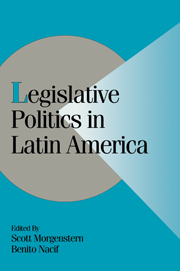Book contents
- Frontmatter
- Contents
- Tables and Figures
- Contributors
- Preface and Acknowledgments
- Party Names and Other Acronyms and Abbreviations
- 1 TOWARDS A MODEL OF LATIN AMERICAN LEGISLATURES
- Part I Executive–Legislative Relations
- Part II Political Parties and Legislative Structure
- Part III Legislatures and the Policy Process
- Part IV Conclusions
- References
- Author Index
- General Index
1 - TOWARDS A MODEL OF LATIN AMERICAN LEGISLATURES
Published online by Cambridge University Press: 14 January 2010
- Frontmatter
- Contents
- Tables and Figures
- Contributors
- Preface and Acknowledgments
- Party Names and Other Acronyms and Abbreviations
- 1 TOWARDS A MODEL OF LATIN AMERICAN LEGISLATURES
- Part I Executive–Legislative Relations
- Part II Political Parties and Legislative Structure
- Part III Legislatures and the Policy Process
- Part IV Conclusions
- References
- Author Index
- General Index
Summary
Ambition, channeled by incentives and institutions, drives politics. Ambitious politicians lead coups and palace takeovers in nondemocracies and engineer election victories and votes of no-confidence in consolidated democracies. In democratic situations, however, these leaders are constrained by party and electoral institutions, constitutions, federal arrangements, and various societal factors. While ambition and political institutions have long driven much research on the United States and other developed democracies, the turbulent histories of Latin American nations have not lent themselves to parallel analyses. In recognition of democracy's movement toward consolidation in much of the region, this book adapts the questions and hypotheses generally applied to studies of the United States and other Western consolidated democratic systems to the analysis of legislative politics in Argentina, Brazil, Chile, and Mexico.
An important change in Latin America is the high value that most voters and politicians profess to place on democracy. At the same time, however, many recent Latin American presidents (maybe not unlike their predecessors or even their U.S. counterparts) have railed against obstructionist, corrupt, or ineffective legislatures. Fujimori used this excuse to close the Peruvian Congress, and Menem in Argentina and Collor in Brazil sought to govern without involving their legislatures. In fear that they would undo his economic reforms and bleed the budget, Pinochet emasculated the Chilean Congress before allowing a transition to civilian rule, and Chavez overtook the odious Venezuelan Congress by (illegally) organizing a plebiscite to create a constituent assembly, which eventually subsumed the Congress.
- Type
- Chapter
- Information
- Legislative Politics in Latin America , pp. 1 - 20Publisher: Cambridge University PressPrint publication year: 2002
- 15
- Cited by

